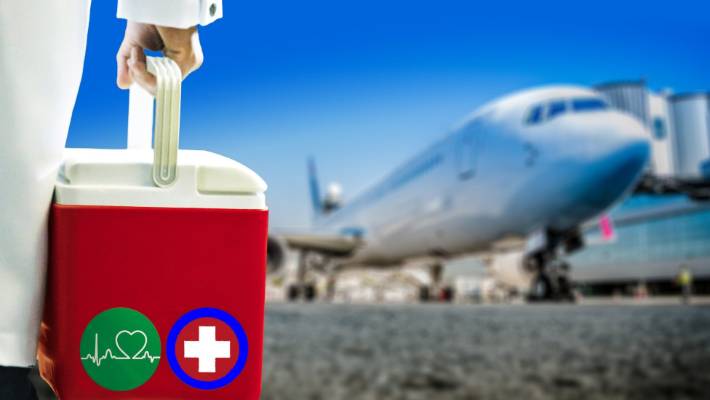“Is there a doctor on board? We have a medical emergency in row 12.”
Your heart skips a beat as you look up from your copy of the New England Journal of Medicine. You quickly unbuckle your seatbelt as you mentally prepare yourself for this opportunity, an opportunity you’ve been waiting for. Now is your chance to put your skills and knowledge to the test, in a resource-limited setting. Now is your chance to make a difference in someone’s life.
And now is your chance to earn 20,000 bonus miles for that trip you want to take next summer.
At some point or another, every physician with even a slight affinity for travel will likely hear the call come over the loudspeaker for a medical professional. As of 2013, there were at least 44,000 in-flight medical emergencies each year, with the most common cases being syncope or respiratory problems2. In the United States, there is no legal obligation to assist in the event of a medical emergency, and there is even legal protection from liability for those who respond to medical emergencies under the Aviation Medical Assistance Act of 19984. The protections mirror the well-known “Good Samaritan Law” regarding negligence and legal risk3. However, one of the stipulations is that the physician who volunteers his/her services must not receive “monetary compensation”. This would seemingly remove any ethical conundrum for a physician volunteering their services, knowing that the motivation can only be altruistic. But legally, airline flight miles and flight vouchers are not “monetary compensation”, and there are physicians who have reported that they’ve received anything ranging from a free premium drink to multiple free flights.
So, the question becomes: is it okay to accept these rewards?
The American Medical Association’s (AMA) Code of Medical Ethics has a position on physicians accepting gifts from patients, the principles of which could be applied here. Granted, the airline offering rewards is not the same as a patient offering a gift, but the scenarios are similar: non-monetary awards for rendering medical care. The language in the Code of Medical Ethics is decidedly vague, basically stating “The physician should be sensitive to the gift’s value relative to the patient’s or physicians means”1. Certainly, a free flight, or even several free flights, would be relatively inconsequential to a multi-million-dollar airline. So perhaps under the AMA’s code it is ethically permissible to accept such a reward for answering the call.
However, the Code also states that any gift or offer should not influence a physician’s medical care. This leads us to question, “Does the possibility of reward affect my willingness to answer a call for help?” One would hope that any good physician would not be motivated to respond to an emergency for any reason other than helping a patient. But it cannot be ignored that most people with a love of travel would be excited to earn a few free flights for doing something that they’d do anyway. So now the Code of Medical Ethics seems to lend credence to both sides of the argument. On one hand, free drinks or flights aren’t likely going to put any airlines out of business. On the other hand, the possibility of a reward that does have significant monetary value for volunteering medical care can tarnish the altruistic nature of providing care in these situations. The desire to help should be out of a concern for the patient, as one would be acting in the role of a good Samaritan.
Overall, does it matter to the patient either way? If one decides to pull themselves out of a mid-flight nap hoping to earn some miles for a trip they want to plan, the patient still receives care. Would the care be influenced by the motivation, whether admirable or materialistic? Perhaps any moral conundrum is solved by simply refraining from accepting any rewards at all, and just helping in a time of need because you can. Or at the very least, after you’ve stabilized your patient, it’s probably best not to ask if your flight comes in the form of reward miles or a voucher.
References
1. Gifts from patients. American Medical Association. https://www.ama-assn.org/delivering-care/ethics/gifts-patients. Accessed October 31, 2021.
2. Peterson DC, Martin-Gill C, Guyette FX, et al. Outcomes of medical emergencies on commercial airline flights. N Engl J Med. 2013;368(22):2075-2083. doi:10.1056/NEJMoa1212052
3. Shepherd B, Macpherson D, Edwards CM. In-flight emergencies: playing The Good Samaritan. J R Soc Med. 2006;99(12):628-631. doi:10.1258/jrsm.99.12.628 4. What are the legal ramifications of assisting with a medical emergency during flight? The ObG Project. https://www.obgproject.com/2018/07/19/what-are-the-legal-ramifications-of-assisting-with-a-medical-emergency-during-flight/. Published October 1, 2021. Accessed October 31, 2021.
Chris Laube is a student in the class of 2023. He was an EMT prior to med school, where he met his wife, and attended most community colleges in the Phoenix area as well as ASU. When not on rotations, he enjoys spending time with his wife and kids, pretending to be an endurance athlete, and video games.

